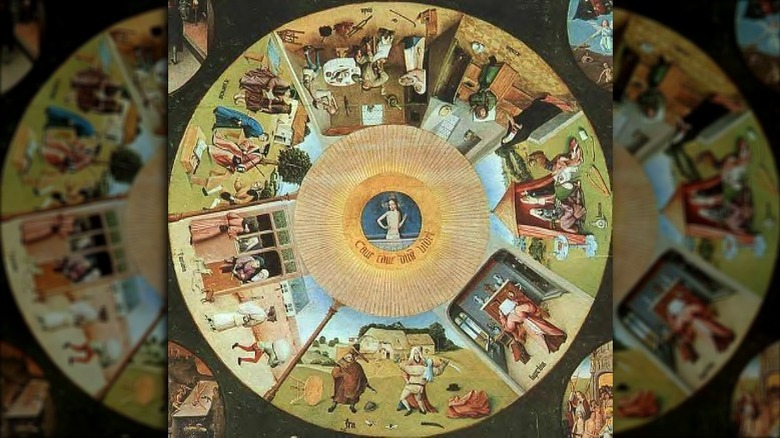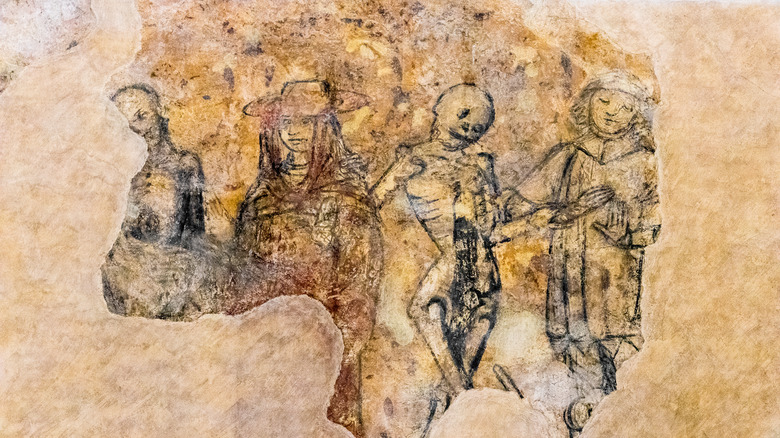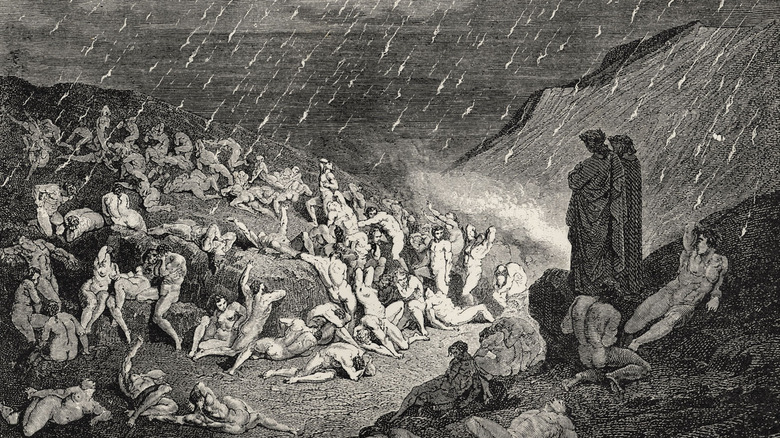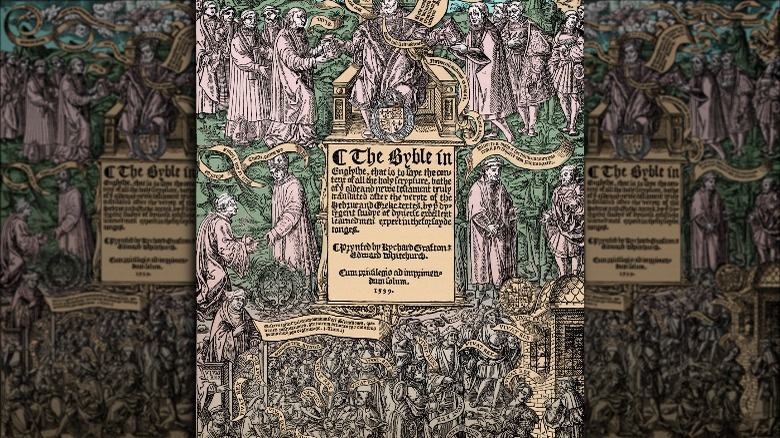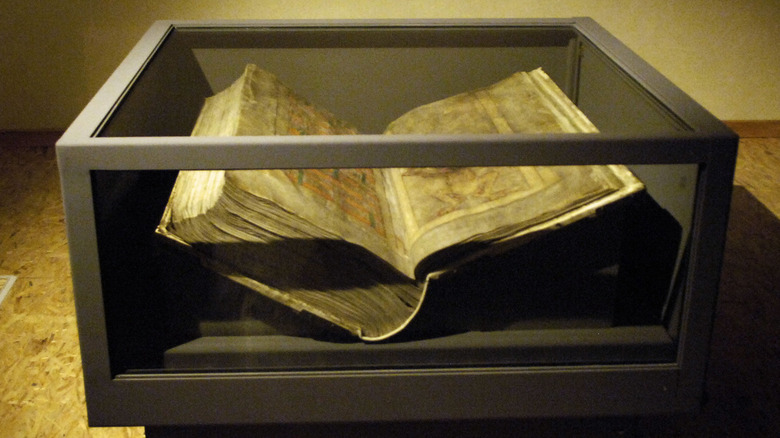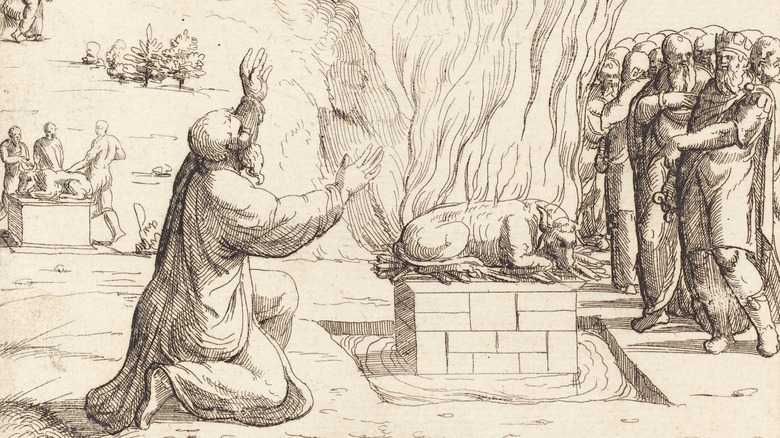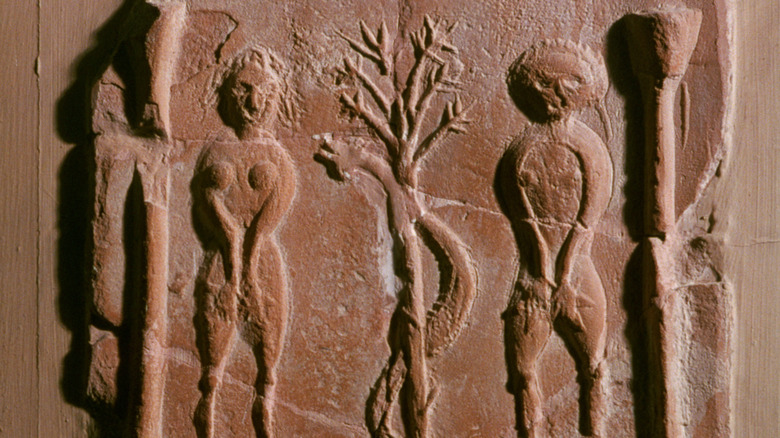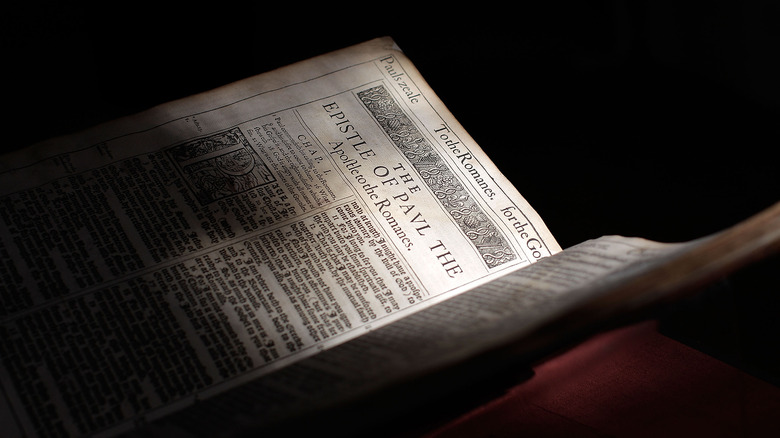The Untold Truth Of The Bible
How well do you know the Bible? If you are a practicing Christian, you'd probably say you know it quite well, or, perhaps, not as well as you'd ought to. If you're a non-believer, you might proudly boast that you don't really know it at all, and you're happy to stick to the books you do like, thank-you-very-much.
But the fact is, whether we want to admit it or not, the Bible permeates western culture like little else we have produced, religious or otherwise. In 2007, Time magazine argued that the Bible "has done more to shape literature, history, entertainment, and culture than any book ever written" (via History Extra).
Our stories, our morals, the sayings we use, and in many cases the names we call each other by all have their origins in the Bible. Whatever your beliefs you are likely to know a lot of what it contains: the story of creation, of Eden, of Moses and the parting of the Red Sea, the birth of Jesus Christ. But what do you know about the Bible itself: about its influence, its composition, and those things the Bible doesn't say, but which most people think it does? Here's the untold truth.
The Bible is bigger than The Beatles
Back in the 1960s, some famous figures were predicting the Bible was on the way out. "Christianity will go," said a 25-year-old John Lennon (pictured) in 1966. "It will vanish and shrink. I needn't argue about that; I know I'm right and I will be proved right. We're more popular than Jesus now. I don't know which will go first – rock and roll or Christianity" (per Rolling Stone). The comment provoked an enormous backlash in the U.S., where Beatles records and memorabilia were burned by outraged Christians, and Lennon was forced to apologize.
But Lennon was wrong. Fifty years after his famous gaffe, the influence of religion has waned very little — as the continued popularity of the Bible demonstrates. In the U.S. alone, it is estimated that at least 168,000 copies of the Bible are sold or distributed each day, more than ever before (per congressional records).
The Beatles may be the best-selling musicians of all time, but the units they shifted pale in comparison to those of the Bible, which Guinness World Records says has sold a huge 5 billion copies, making it the most popular book in the world, the popularity of which shows little sign of abating.
The Bible: a writer's handbook
It is a misapprehension to assume that only religious writers are influenced by the Bible; in fact, the holy text has had a profound influence on writing in English ever since it was translated into the language, and especially after the ready availability in England of the King James Bible (KJV) in 1611.
As The Washington Times argues, while the Bible is undoubtedly a religious text, it is a literary one, too. As an anthology of many books written in many different times and places, the Bible speaks in many voices through various literary forms: letters, poems, dialogues, narratives, and more have together come to influence writers of literature in suggesting forms that their ideas may inhabit. More directly, Biblical stories have been exploited down the centuries by writers who have wanted to create an intentional allegory — C.S. Lewis' "Chronicles of Narnia" series is a notable example — but also by those looking for plot and structure.
Many of the world's more respected writers have been vocal about the influence of the Bible when it comes to the poetry of the writing itself. In "Paris was our Mistress," a memoir of his days as part of the European literary circles of the 1920s, Samuel Putnam says that Ernest Hemingway (pictured) claimed to have learned to write "by reading the Bible," while the author himself once remarked in a letter to F. Scott Fitzgerald that the good book is a great source of titles for literary works, such as his novel "The Sun Also Rises," which is taken from the book of Ecclesiastes.
The Bible doesn't mention the seven deadly sins
It is a common belief that all Christian teaching is handed down to us from the Bible. In fact, many of the ideas we have about Christian morality come from disparate sources, especially theologians whose interpretations of scripture then take on a life of their own.
One of these is the idea that there exist "seven deadly sins," also known as "capital sins": pride, greed, lust, envy, gluttony, wrath, and sloth, which have worked their way into popular culture as a pillar of Christian belief, including in the 1995 Morgan Freeman and Brad Pitt movie "Seven"). However, according to Britannica, this categorization of "mortal" sins into seven groups doesn't occur in the Bible at all, but was developed in the 4th century A.D. by John Cassian, an ascetic, theologian, and abbot who arrived at his concept of the seven deadly sins through interpretation of various passages he analyzed throughout the Bible and worked into a teachable doctrine, which became highly influential, especially in the Catholic faith, with the Catholic Church declaring Cassian a Saint as a result of his work.
Open Bible lists several passages that come close to echoing what we consider the seven deadly sins today, but nowhere does the holy text list them as it does the Ten Commandments.
The Bible doesn't mention Purgatory
Another concept central to the teaching of Catholicism is that of purgatory, a place — or process — different from hell in which believers say purifies the souls of repentant sinners and eventually allows them to enter heaven, according to Britannica. "The Catechism of the Catholic Church" — a notable work of Catholic theology published in 1992 with the approval of Pope John Paul II — describes purgatory as the fate of those "who die in God's grace and friendship, but still imperfectly purified," who through purgatory undergo "purification, so as to achieve the holiness necessary to enter the joy of heaven" (via Catholic Answers).
But though purgatory has become central to contemporary Catholic doctrine, it is not overtly mentioned in the Bible at all. In fact, the concept of purgatory as a place only arose in the Middle Ages through interpreting certain passages of the Bible that describe death's "purifying fire," and concluding that such a place must exist in light of God's mercy, that impure souls willing to repent are not automatically damned (via Britannica).
Our idea of hell comes from more than the Bible
Though its fiery image is emblazoned in the imaginations of most westerners — especially those who were taught that it is a literal place, such as those raised in the Catholic tradition — hell in Judeo-Christianity has transformed hugely since the compiling of the Hebrew Bible or Old Testament more than two millennia ago.
As the religious scholar and author of "Heaven and Hell: A History of the Afterlife" Bart Ehrman told NPR, the assumption that the Old Testament contains multiple references to Hell is based on a mistranslation of the Hebrew word "Sheol," which Ehrman claims is closer to the literal word "grave" than the underworld of the dead. Writing for Time, Ehrman explains that the Hebrew Bible "assumes that the dead are simply dead."
It is the New Testament that promises an eternal afterlife, though as Ehrman explains, the image of hell as a fiery pit is mentioned just briefly in Revelation. The image has been expanded upon by non-Biblical texts and artists such as Dante, whose epic poem "Inferno" gives the reader a guided tour of hell and describes its nine "circles," each more horrible than the last, in which sinners are found being tortured in increasing agony. Meanwhile, artists such as Hieronymus Bosch have responded to Dante by bringing to life the unbearable tortures of hell in terrifying detail.
We can thank Henry VIII for the English Bible
Though King James I's "authoritative" version of the Bible of 1611 is thought of as the definitive English version, it did, in fact, have one important precursor: the "Great Bible," commissioned especially by one of England's most famous — or, perhaps, notorious — kings: Henry VIII.
According to the British Library – who hold what many experts believe may have been Henry VIII's own personal copy of the Great Bible — for centuries English editions of the Bible were illegal, and existed in England only in the language of the Catholic Church: Latin. That was until 1536 when Henry saw the political advantage to be gained in spreading the holy scriptures in the native tongue of his subjects.
In 1534, Henry VIII had separated England from the See of Rome — which gave jurisdiction of the country's churches to the Pope — and established his own nativist Church of England, which had the King as its head (per Rochester Cathedral). By 1541, more than 9,000 English Bibles — based on formerly illegal translations by the Protestant sympathizer William Tyndale, who was executed in 1534, per the British Library — were distributed among England's churches, whose pastors were ordered to purchase the works by Henry's shady facilitator, Thomas Cromwell. Per Rochester Cathedral, the title page of the Great Bible (pictured) includes images of both Henry and Cromwell interacting with Biblical figures, with Jesus Christ saying in reference to the King: "a man after my heart who will do all my will."
Were books systematically removed from the Bible?
Though today the Bible is considered to be a fixed text containing a certain number of books, its history is far more fluid. Before the existence of the Hebrew Bible which predates the Old Testament, various holy texts and religious documents circulated among ancient scholars and holy men, usually in scroll form. According to John Barton, a former professor of holy scriptures at the University of Oxford, such scrolls had been studied and shared for centuries before sometime in the first century B.C., when 39 of these texts were collected "as a work of early Judaism" to form the Hebrew Bible, which Christians now refer to as the Old Testament (via History Extra).
When it comes to the formation of the New Testament in the years following the crucifixion of Jesus Christ, The British Academy explains that there is a common misconception (made especially prominent by Dan Brown's novel "The Da Vinci Code") that in a rush to define the Gospels along orthodox lines, various writings deemed heretical were ousted by the councils looking to form the new Biblical canon. However, the source argues that, apart from the Gospel of St. Thomas, most of the books that are said to have been excluded were in fact written much later, while those included had been held to be Christian doctrine long before the written texts were officially compiled.
In later centuries, books have sometimes been excluded from the Bible at times of great change, such as in the Lutheran Bible and even the King James Bible, which originally excluded 14 books. Nowadays, most of these works are included in modern Bibles as "Apocrypha."
The Bible can be snarky
For many, the Bible speaks in two distinct voices: that of the Old Testament, which has often been described as "fire and brimstone" and which warns, chides, and chastises, and that of the New Testament, which, broadly speaking, delivers its message in softer tones. Both parts of the Bible are generally thought to be direct and sincere. But despite this, there are numerous moments in its 1,189 chapters where snark and sarcasm give the reader a moment of comic relief, proving that our love of a salty putdown is deep-rooted.
In 1 King 18:27, for example, the prophet Elijah confronts a group of worshippers of the god Baal, who are in the middle of offering a sacrifice. When the worshippers receive no response from their god, Elijah hits them with this sarcastic rebuke: 'Cry aloud, for he is a god. Either he is musing, or he is relieving himself, or he is on a journey, or perhaps he is asleep and must be awakened.'" (via Bible Hub) Who knew trolling was more than 2,500 years old?
More modern versions of the Bible, such as the Good News Bible published in 1966, foreground the humor inherent in many verses. Take, for example, this stand-up style line from Proverbs 26:13: "Why don't lazy people ever get out of the house? What are they afraid of? Lions?" (via Bible Study Tools).
One of the most valuable Bibles tells readers to have affairs
Whether you are a believer or not, you are likely to be familiar with the Ten Commandments, the basic rules of good behavior handed down from God to Moses in the book of Exodus, and which Moses brought to his followers on stone tablets which were then held in a beautiful gold chest known as the Ark of the Covenant (per Britannica).
The Ark and its contents are now sadly lost, but the words upon them have remained central to both Jewish and Christian faiths down the centuries, reiterated on scrolls, in sermons, and, of course, in the Bible. However, not all Bibles have carried the exact same version of the Ten Commandments, with one version printed just after the publication of the King James Bible especially notable.
According to The Guardian, In 1631, two decades after the appearance of the King James Bible, King Charles I commissioned a pair of London printers, Robert Barker — who produced the original KJB — and Martin Lucas, to produce 1,000 new copies of the Bible, an expensive and time-consuming task even after the dawn of printing. However, there was an unfortunate error in their version: between the familiar Commandments "thou shalt not kill" and "thou shalt not steal" is a Commandment missing an all-important "not," which reads: "thou shalt commit adultery."
Ten copies of the "Sinners' Bible" or "Wicked Bible" are known to exist, one of which was sold at Sotheby's for $56,250 in 2018 .
The conflation of the serpent and Satan took 1,500 years
When you think of the story of Adam and Eve, and of their eating of the fruit from the Tree of Knowledge that led to their expulsion from Eden and the Fall of Man, who do you believe it was that put the idea in their heads?
The story goes that it was first Eve who was tempted to eat from the Tree, despite being told that eating the fruit of the tree was deadly, by a serpent who told her: "You will not surely die. For God knows that when you eat of it your eyes will be opened, and you will be like God, knowing good and evil" (per Open Bible).
Most modern Christians now consider the serpent to be a manifestation of Satan himself. But this idea does not appear in "Genesis," or even the Old Testament; instead, it is only confirmed in the final book of the New Testament, "Revelation," written some 1,500 years after the first book of the Bible. As scholars have noted, even the idea of the Devil is believed to have been developed only 900 years after the story of the Garden of Eden was first formulated (via The Biblical Archaeology Society).
Though Revelation does indeed provide a late Biblical reference for the serpent's Satanic identity, the most influential conflation of the serpent and the Devil arguably occurs in a non-Biblical text: John Milton's epic poem, "Paradise Lost."
The King James Bible: a 'miracle' of English literature
The 1611 King James Bible is held among most academics as the most seismic version of the text in English in terms of its impact as a literary work. The literary critic and journalist Robert McCrum goes as far as to say that the KJB "shaped the English language," and its influence can still be felt 400 years after its first publication. (via The Guardian)
McCrum argues that this version of the Bible has "shaped our imaginative landscape," and points out the huge array of phrases found in the text that are still used in our everyday language even now. To "fight the good fight?" That's from 1 Timothy 6:12 (via Open Bible), while Prince fans may be interested to note that the "sign of the times" was a phrase first found in the KJB's Matthew 16:3.
In fact, so successful was the King James version that some scholars have suggested that William Shakespeare himself — who was alive and working at the start of the 17th century — may have had a hand in its composition. However, as Britannica notes, this is likely a myth; a committee of 47 translators and writers are known to have had a hand in the creation of the KJB, though who is responsible for each part of the finished text is still a mystery.
Is the Bible the most stolen book in the world?
Despite the Ten Commandments having reminded mankind that theft is wrong for more than 3,000 years according to Britannica, stealing is still one of mankind's habitual vices. Though somewhat unexpectedly, it appears that the kleptomaniacs of the world might be looking to the Good Book for some advice on how to change their ways.
CNN Money had reported that the Bible — the planet's all-time bestseller — is also the most stolen book in the world as recently as 2013. However, they also noted that Bibles are often distributed free of charge in churches, which may give the impression that they are up for grabs more generally; and with the number of Bibles found in hotel rooms, no wonder so many go missing.
Steve Bercu, the owner of the BookPeople bookstore in Austin, Texas, confirmed that the Bible was the most shoplifted book in the store when he spoke to the New York Times in 2009. "Some people think the word of God should be free," he told them.



